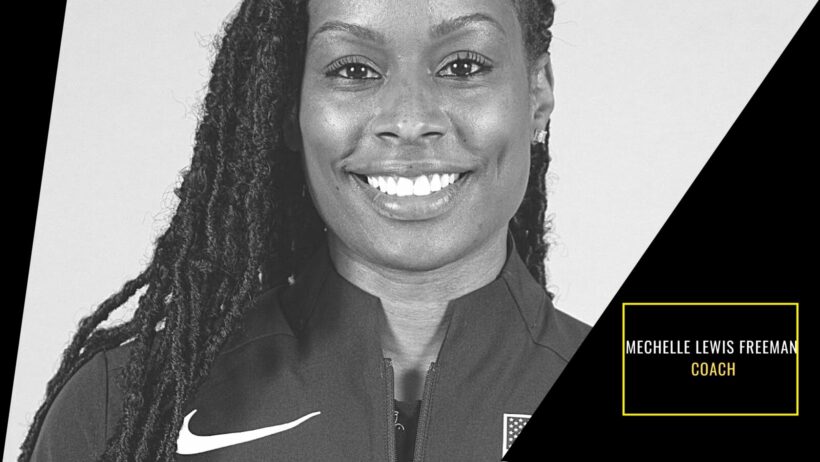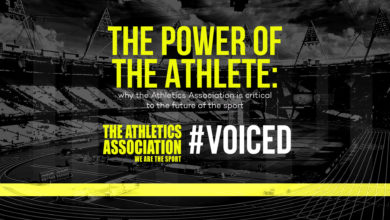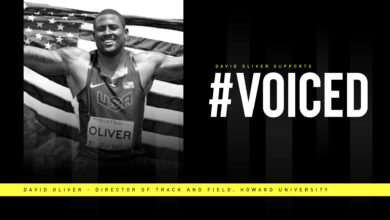Country: United States of America
Profession: USATF Women’s Relays Head Coach, Former 100m athlete
Career highlights:
- 2008 Beijing Olympian
- 2007 World Champion – 4x100m Relay
- 2007 Pan American Games 2x silver medallist – 100m and 4x100m Relay
Since retiring from elite sports Mechelle has served as the USATF Athletes Advisory Committee Women’s Sprints Event Leader and the USOC Athletes Advisory Representative. She is the founder of TrackGirlz, a non-profit organization that provides girls with access to sisterhood, empowerment and track and field.
Of all your incredible achievements, which one is your most memorable and why?
That’s a tough one! But just because it’s so fresh – coming off the World Championships this summer on US soil, being the underdogs when no one thought we could pull it off (including my mother and my husband), I would say the women’s 4x100m relay winning World Champs gold is my most memorable moment as a coach.
We were really intentional on how we approached that moment and they executed perfectly. I recognize the responsibility of my role to lead and achieve results, and really worked on putting an effective plan together. When I look at that race each one of those women did their job.The last thing TeeTee told us before going into the check-in tent was “If you get the baton to me in the front, nobody is catching me!”. She did exactly what she said she was going to do, she delivered – they all delivered.
As an athlete, I made the 2008 Olympic team for the relay and Beijing was one of my most memorable athlete memories. In a relay, it is hard when you are not sure if you will be running, but I so badly wanted to be one of the six women to run on that relay. I just remember getting to Beijing and doing everything I could mentally, physically, and emotionally to be ready. I remember the day, when they called me in 48 hours before the race and said, “Lewis you are running second leg”.
I will never forget that moment because it changed my life (although the outcome wasn’t exactly what I wanted). The time that I put in was worth it. I had taken four years off from running to work in corporate marketing, and then decided to quit my job two years before the 2008 Olympics. So, when they said my name and I was actually going to be running in that stadium knowing that two years before I was in the office cubical – alot of things were going through my mind. It was an immense amount of gratitude and faith. I will never forget that day because I will always be really grateful for being one of the four women that to represent USA that day for the 4x100m relay.
When did you know that your time as an elite athlete had come to an end?
When you can no longer train in a way you know is necessary for you to be competitive at the highest level, then you can’t waste anybody’s time and you know you must stop.
I only had two strong years competing, but in that time, I was the NACAC 100m champion, Pan American Double Silver Medallist, World Champion in the 4x100m relay and went to the Olympic Games. I went to every major championship in those two years! So when I got a back injury (I hurt my disc), I had surgery, but even with that, my body could no longer do the amount of work that I knew was necessary.
The good thing is that I had a job before I decided to be an elite athlete. I went to Graduate School and got my Master’s Degree in Integrated Marketing Communication and worked in one of the top advertising agencies in the world at Y&R New York. So, when I knew it was time to stop running, I went back to corporate America, back to working in marketing.
Can you tell us a bit about the challenges you faced in the transition from elite athlete to ‘normal life’?
For me the major challenge was the emotional component of the transition. I was not prepared for the emotional toll it would have on me! You go from having global success, signing autographs, traveling the world…to going to work at 9am, attending status meetings, taking notes, going to production sets, and ordering lunch for the work crew. I had to show how I could still be great at things (because I wasn’t able to make being the fastest woman in the room matter in business!). I had to figure out how I could matter in that space. It took time for me to transition and understand that I can still be the best and feel the best in new ways. In the end you have to be patient with yourself and focus on going through the process to find what is next for you.
What helped you in the transition into the working world?
I was coming out of the sport at a time where the IOC was starting to recognize the importance of supporting athletes as they transition. I was one of the first athletes to work with the US Olympic Committee’s Athlete’s Career Program (now called Athlete Career and Education). It was the first time they were offering an opportunity to work with their top partners through a one-year internship with Coca-Cola’s Global Sports Marketing Team. I had an opportunity to help manage their 2012 London Olympic Games sponsorship activations. It was great to go back to the Olympics, but this time in a different capacity! This experience helped me combine what I enjoyed in sports and my marketing career.
Our federations recognize the importance of supporting athletes in transition and have definitely grown in that space. I also see that more and more athletes are taking responsibility for their future after their track and field careers are over. They have really started to create their personal brands and develop skills, interests, and talents beyond the track so when they transition, they are prepared.
Why do you think sisterhood is important for young athletes?
My twin sister has been there for me during the hardest moments and the best moments in my life. It’s good to know someone has your back, and you have theirs, someone understands you, loves you and is someone you can depend on. Sisterhood has meant so much to me over the course of my life.
Track and field has also given me the opportunity to develop some deep friendships from a young age, and I wanted to be able to give that experience of sisterhood to other girls.
I started TrackGirlz to ensure girls have access, education, community, and support to do the things that they want to do – and set them up for success in the future. I think a community of women is very important to do that. Through TrackGirlz we are able to provide world-class sport specific women mentors through our empowerment workshops where we use our curriculum to support the mental, physical, and social development of middle and high school girls. We also offer grants for girls to have access to track and field in their local communities. We have awarded grants to cover transportation costs, new uniforms and equipment, including a racing wheelchair. I am proud of the communities and girls we have been able to serve and empower.
Who was your ‘worthy rival’ while competing?
It depends on how you look at it; you have your high school rivals, your college rivals, your US rivals because you have to make the team, and then you’ve got your global rivals because you have to medal. There was a time when I was lining up with Carmelita Jeter, Allyson Felix, Lauren Williams, Muna Lee, Torri Edwards and Angela Williams. These are NCAA champions, world champions and Olympic medallists – and then there’s Mechelle Lewis in Lane 7. I am so grateful to have the opportunity to run with and be competitive against such phenomenal women and athletes.
From a global standpoint I ran against Veronica Campbell, Merlene Ottey, and Christine Arron from France. I ran against so many honourable women that have had an impact on the sport, on its culture and on history. I am just grateful to be a part of a body of women that have contributed to this world in the way that they have. Even growing up in Maryland, we had many women that made their own waves in the sport. So, I’ve always been around some very impactful women on and off the track.
What view will you never get tired seeing?
This goes back to the first question, and because I watched the video just yesterday. For now, my favourite view is TeeTee crossing that finish line and hitting that motor bike celebration in Oregon!
But, let me tell you, you can only live in that for so long because we’ve got #Budapest23 and #Paris24 ahead and I always know we’ve got work to do. I’m just grateful for the opportunity to coach – grateful for the opportunity to be in that position to see incredible athletes achieving great things and I look forward to the challenges and opportunities ahead and to creating more memories and views that I won’t get tired of seeing.


